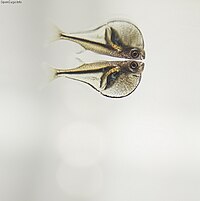Difference between revisions of "Carnegiella myersi"
From The Aquarium Wiki
m |
|||
| Line 35: | Line 35: | ||
|max_water_hardness=20 | |max_water_hardness=20 | ||
}} | }} | ||
| − | + | ||
| − | + | == Origin == | |
| − | + | :South America: Amazon River basin in Peru. | |
| − | + | ||
| − | + | ||
| − | + | == Sexing == | |
| − | + | :Very difficult to visually sex, most will only be able to be sexed when the female is holding eggs. Tricky to breed in captivity. | |
| − | + | ||
| − | + | ||
| − | + | == Tank compatibility == | |
| + | :Peaceful shoaling fish, should be kept in groups of 6 or more. Best kept with mid-bottom dwelling and peaceful tank mates such as [[Corydoras]]. | ||
| + | |||
| + | |||
| + | == Diet == | ||
| + | :Will accept most floating foods including pellet and flake as well as live/frozen food like [[brine shrimp]]. | ||
| + | |||
| + | |||
| + | == Feeding regime == | ||
| + | :Feed once or twice a day. | ||
| + | |||
| + | |||
| + | == Environment specifics == | ||
| + | :A well-filtered mature tank without very bright lighting is needed for this fish. They do not do well in strong currents. A secure lid is a must for this fish, they can get through even the smallest of gaps. | ||
| + | |||
| + | |||
| + | == Behaviour == | ||
| + | :Entirely top-dwelling fish, known to jump out the water when startled. | ||
| + | |||
| + | |||
| + | == Identification == | ||
| + | :Typical deep-bodied triangular Hatchetfish in shape. The body is silvery and almost translucent with some skeleton visible. It has a black lateral line running along the top of the body to the caudal peduncle. Fins are translucent. | ||
| + | |||
| + | |||
{{Categories | {{Categories | ||
|Category=Fish, Fish (Freshwater), Oddballs, Hatchetfish, Shoaling Community Fish | |Category=Fish, Fish (Freshwater), Oddballs, Hatchetfish, Shoaling Community Fish | ||
Latest revision as of 03:14, 13 December 2017
Pygmy Hatchetfish
Carnegiella myersi
38 Litres (10 US G.)
2-2.5cm (0.8-1 ")
Freshwater
5.5 - 6.5
23 -26 °C (73.4-78.8°F)
10-20 °d
1:3 M:F
3-5 years
Family
Gasteropelecidae
Contents
Additional names
- Pygmy Hatchetfish, Myers Hatchetfish, Glass Hatchetfish
Origin[edit]
- South America: Amazon River basin in Peru.
Sexing[edit]
- Very difficult to visually sex, most will only be able to be sexed when the female is holding eggs. Tricky to breed in captivity.
Tank compatibility[edit]
- Peaceful shoaling fish, should be kept in groups of 6 or more. Best kept with mid-bottom dwelling and peaceful tank mates such as Corydoras.
Diet[edit]
- Will accept most floating foods including pellet and flake as well as live/frozen food like brine shrimp.
Feeding regime[edit]
- Feed once or twice a day.
Environment specifics[edit]
- A well-filtered mature tank without very bright lighting is needed for this fish. They do not do well in strong currents. A secure lid is a must for this fish, they can get through even the smallest of gaps.
Behaviour[edit]
- Entirely top-dwelling fish, known to jump out the water when startled.
Identification[edit]
- Typical deep-bodied triangular Hatchetfish in shape. The body is silvery and almost translucent with some skeleton visible. It has a black lateral line running along the top of the body to the caudal peduncle. Fins are translucent.
Pictures[edit]
Videos[edit]
External links[edit]
- Fishbase (Mirrors:
 )
)
